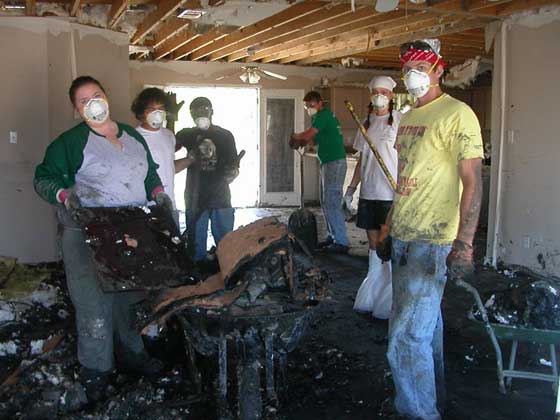|
|

| October 2005 Nine Jepson Students Aid Gulf Coast Residents in Clean-Up Efforts Nine Jepson students were among the 24 Bonner Scholars who traveled to Mississippi during fall break to assist in the clean-up efforts following Hurricane Katrina. Bonner Scholar coordinator Grace Holcomb, Jepson associate dean Teresa Williams and the students piled into three vans about 3 p.m. Friday, October 14, for the 900-plus-mile drive to Hattiesburg, Miss. After a virtually sleepless night on the road, the volunteer crew arrived at 7 a.m. Saturday and set to work almost immediately in Hattiesburg and nearby Waveland, the worst-hit town in Mississippi. Everyone expressed disbelief at the overwhelming devastation that greeted them almost two months after Katrina battered the Gulf Coast. Williams described the scene vividly: “We found personal belongings—a book on how to buy your first house, a piano peddle and a beaded necklace—among the dead fish and crabs that littered the beach. Streets were unrecognizable because of the debris. People’s clothes were still hanging in the trees where the hurricane had tossed them. “Many of Waveland’s poorest residents were still living in tents in the Kmart parking lot with no water, electricity or proper bathroom facilities. Fortunately, there were a couple of port-o-johns on the premises, and the Red Cross was providing hot meals two times a day.” Accommodations for the volunteers weren’t much better. At night the Richmond contingent sprawled in sleeping bags on the floor of a third-grade classroom in St. Thomas Aquinas Catholic School in Hattiesburg. The 26 Spiders shared three showers in the adjacent St. Thomas Aquinas Church with 75 volunteers from the University of Charleston and eight volunteers from the University of Notre Dame. But the accommodations seemed luxurious in comparison to the working conditions. Students wore goggles, face masks and plastic bags up to their knees to protect them from the five-inch-deep sludge covering the floors of the homes they cleaned. The Bonner Scholars gutted two of the four houses they worked on. Students also removed trees and debris and assisted with supply distribution.
Students assist in Hurricane Katrina clean-up efforts in Waveland, Miss. Despite the obvious hardships, the trip proved a valuable learning and service experience, Jepson student Allison DuVal said. She reflected on the words of a plaque in Waveland commemorating the volunteers who came to the town’s aid when Hurricane Camille decimated the region in 1969: “Those who cared came to [our] rescue.” “I read those words not simply as an expression of gratitude,” DuVal said, “but primarily as a call to action. Do we, as a society and as individuals, care enough to do what is hard, what is right? Do we care about the continuing condition of the poor or just about the short-term needs publicized in the immediate aftermath [of a natural disaster]? “I hope that I and the other students who went on this trip will be able to effectively utilize our experiences to inform our understanding of the importance of cooperative action, of the need to give voice and aid to the millions of silenced Americans living in poverty and of the necessity of dynamic changes in our personal choices and structural-level policies to reflect a deeper sense of social responsibility.” |
